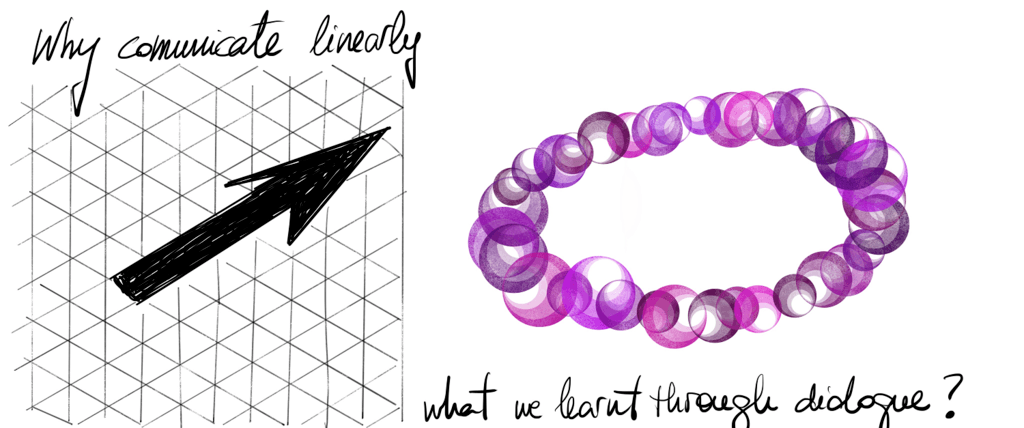Rethinking the Communication of Action Research: Can We Make it Dialogic?

Post written by Patricia Canto-Farachala and Miren Larrea
Action research (AR) does not aim to examine reality, it aims to change reality and it does so through dialogue. Dialogue is at the heart of the relational, collaborative learning processes through which we engage with others to transform our spaces into better places. Why then do we abandon dialogue when we share our lessons from AR processes in our academic writing? Why do we replace it with traditional formats that follow a linear path to readers in papers, books and reports? Is there no room for a transformative dialogue when communicating the academic outputs of AR processes? Is this maybe a dark shade on the light of action research as the editors in this issue suggest?
Our paper tells the story of a research process in which we explored how to share an academic output dialogically. There is of course a paradox in that we write about a new way of communicating academic outputs from AR, yet we follow a traditional linear communication pattern where we “do all the talking”. However, in an attempt to permeate your reading with what we learned from our experiment; we invite you to have the following questions in mind as you take in what we wrote: Why do you write your action research experiences? Do you have any expectations regarding what readers will do with your writing? Would you like to explore novel ways of making what you share more actionable for them? What concrete steps might you take to do so?
The story in our paper involves a book, written to share the action research experience of one of us (Miren Larrea) and her co-author. The book was the third volume of an open access collection that aspired to connect the experiences of action researchers working in territorial development processes in different parts of the world. The other one of us (Patricia Canto-Farachala) was chief editor of the collection and had begun her PhD inspired by the possibilities that the book collection offered to experiment with novel approaches to research communication. She facilitated the AR process that helped the authors of the book to reflect on the questions that we posed for you above, drawing from the literature on participatory communication.
We learned that three things happen when academic outputs written from AR processes are communicated dialogically: (i) authors are transformed into facilitators; (ii) readers are transformed into authors and (iii) action research can be the methodology to enable these transformations. We also learned that communicating academic outputs dialogically takes time and resources that are not available for researchers in the current academic landscape and that special circumstances need to come together to make the effort possible.
But, when those circumstances come together, is it worth the effort? Our experience is that when dialogical communication of academic outputs is designed keeping in mind its sustainability it certainly is worth the effort. As a result of our experiment, the book is being communicated dialogically in a virtual space (click HERE if you are curious: https://dgroups.org/groups/perfadt) set up to help readers make the knowledge that is being communicated actionable in their own context. As of today, nearly 600 people from 23 different countries have engaged with the authors in this dialogue. This is what connectivity, a dialogical approach to the transferability of academic outputs (Karlsen & Larrea, 2014) looks like in practice.
Dr. Alfredo Ortiz, who led the review of this article wrote “This piece challenges us to think about what we are actually trying to accomplish when we set out to write about our action research experiences. If we really care about participation, collaborative knowledge construction and actual use and usefulness of our research, why is it that we mindlessly suspend all of these thoughts when we move into writing mode?”
You will find this article on line at ARJ with this link: https://journals.sagepub.com/doi/full/10.1177/1476750320905896
